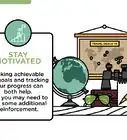This article was co-authored by Lauren Krasny. Lauren Krasny is a Leadership and Executive Coach and the Founder of Reignite Coaching, her professional and personal coaching service based in the San Francisco Bay Area. She also currently coaches for the LEAD Program at Stanford University Graduate School of Business and is a former Digital Health Coach for Omada Health and Modern Health. Lauren received her coaching training from the Coach Training Institute (CTI). She holds a BA in Psychology from the University of Michigan.
This article has been viewed 46,875 times.
A personal code is the philosophy you have about life and the way you want to live it. You determine what defines you, the values you want to work toward and what you will base your decisions on. It takes dedication and hard work to adhere to your code. Here are some ways to help you do that.
Steps
Going Over Your Code
-
1Find a quiet place. Remove distractions so that you are able to think clearly. You want to focus on what is important so that you can absorb and retain the information. The more familiar you are with your personal code, the more likely you will be able to apply it to your life.
-
2Come up with core values. Decide what makes your life meaningful. Determine what guidelines you want to employ in your daily life to help you make decisions. Come up with your code and go over specific details about why each value is important to you.[1]
- Values are the unique life beliefs and principles that you feel are most important to you.They are the things you believe in and want to support or that you feel are not beneficial or harmful and want to avoid.
- Think about what being honorable or ethical means to you. What do honorable or ethical people do or not do? When you think about people who represent these values, what is it about them that you admire?
- If there are things you want to change about your community or the world, figure out what they are and why. This can help you narrow down what your personal values are.
- Consider the issues that you feel most strongly about. What are you passionate about during conversations or when you hear others talking? Is there an underlying moral principle here that you feel is essential to living a good life?
Advertisement -
3Write down your code. Writing down your personal code and associated goals means you can clarify what you want. Writing down your intention motivates you to take action. Plus, you’re much more likely to realize your goals when you write them down.[2]
- Write short sentences with tangible meaning, such as, “I will refrain from causing physical harm to those who threaten to physically harm me or my loved ones."
- Include conditional modifiers for various situations, such as, “I will not steal unless there is no other option to feed my family, e.g. during a time of war or natural disaster.”
-
4Sign and date your code. Confirm your decision with a signature. This makes it more ‘official’ for you and increases your commitment level. Know that you mean to follow through.
-
5Set goals. Goals direct us, allow us keep pace with our values, help us to be happier and even achieve more.[3] In order to stick to your personal code, set goals for when you want to follow each part of your code and how often you want to apply it.
- Make a list of challenges related to your goal. Things will stand in the way. Be prepared for them by thinking about what situations could arise that might test your personal code. Think about how you can handle or minimize those obstacles.
- If a friend wants you to do something you're not sure about, refer to your personal code to see whether the action conflicts with one of them. If your code dictates not hurting someone else, then consider whether your action might hurt or cause someone distress. Popping tires, for example, might seem funny at the time but maybe the person can't afford new ones and can no longer get to work to provide for their entire family.
- Break down your goals into smaller actions. If you want to be an honorable person, decide what actions will make you honorable—preferably ones you can practice in your day-to-day life. Helping an elderly person pick up items they drop, returning lost money and not using offensive language are all opportunities for you to be an honorable person.
-
6Visualize your success. Imagine who you will be in the future once you have mastered your personal code. Try to make your visualization as real and detailed to you as possible. You can also write down the person you imagine to make it feel more tangible.[4]
- Choose a timeline in the future, whether it's a week, a year or 10 years from right now. During your visualization exercise, imagine that you are living your personal code and have achieved your short and long term goals.[5]
- See the areas of your life that you have mastered. Be very specific about the person you visualize. What are you wearing? Are you smiling? What will your day-to-day life be like?
- Write down what you see and turn your visualization into a real possibility organized around concrete goals and values. Concentrate on the character strengths that have helped you reach your goals, be the person you want to be and achieve the life you want to live.[6]
- An example might be: "I will need to use my positive attitude, teambuilding skills and compassionate personality to help develop services for the homeless in my community within 5 years. I will also be a good friend, father and husband by supporting those I care about, conquering selfish desires, spending wisely and referring to my code."
Living Your Code
-
1Make use of your code. You want to be able to live your code and minimize the things that distract from living your life the way you want to. Life isn’t always going to go smoothly so you need to practice applying your code to multiple situations. The more you think about how you want to react to certain situations and then actually do it, the easier it will get.
- During an emotional episode, your personal code can help you to make the best decision—but you have to remember to use it. Otherwise, you may be left to deal with a persuasive personality or circumstance without any personal guidance.
- While horsing around with your teenage friends, one of them may suddenly dare you to put something in your coat and walk out a store. However, if you have previously decided that you won’t steal, you'll have an automatic response.
-
2Start small. Some values will be easier to apply than others. Start using the ones that come more naturally first and build on those. If you want to help people, start off smiling at strangers who may be having a hard day, then move up to volunteering or donating. The more you can use your code in day-to-day activities, the more you will start to live it.
-
3Overcome resistance. Every time you come up with a plan or goal that is important to your life, you will encounter some form of resistance. Things that take time and effort can be demanding mentally and physically. You can overcome this by focusing on the reason you want to reach your goal. In this case, your personal code gives value to your entire life.
-
4Celebrate progress. When you apply your code successfully to a challenge or experience in your life, recognize it. Write it down, if you can, or mark it in some way to show how far you have come. Celebrate victories, even small ones—all together, they will get you where you need to be.
-
5Be persistent. Things will get in your way, and it will be easier sometimes to give up and do what is easiest instead of following your code. Instead, just keep applying your personal code to your life every day and with every decision you make. Know that practicing discipline and making your code a habit will make your code second nature.
- If you make a mistake, don’t use that as an excuse to throw away your personal code. Use it as a chance to learn why you weren’t able to apply your personal code to the situation. This kind of insight will allow you to do better next time.
-
6Ask for help. Find someone else with a similar code or goals in life. It could be a friend or family member. Look out for each other. A partner can be a great motivator as well as the voice of reason, reminding you about your code when tough situations happen.
- Make sure your partner supports you and your personal code. Even if you share different values and beliefs, your partner should understand the importance of your personal code to you. Never let someone demean you or make you feel bad for trying to better yourself. If they do, it is probably time to seek counseling or move on.
Modifying Your Code
-
1Review your code periodically. Writing a code gives definition and meaning to who you are, but remember that it is not written in stone. Like you, your code should grow and be adaptable as your experiences, convictions and ideals expand.
- Look back over your code and your life to see where you have been successful in implementing it as well as the times you might be able to do a little better now. You can use all this information as a roadmap to help you see where you want to be more clearly and perhaps show you how to get there (or how not to).
-
2Adjust your code. If you attempt to apply your code to real life experiences and find that you feel differently in practice, then reconsider one or more of your ideals. Values and personal ethics are developed through trial and error. Make adjustments based on new opinions or advice.
- Perhaps you became a vegan because you did not want to cause harm to any living thing. Maybe you then got sick from lack of protein or lost too much weight. In a way, this could be considered causing harm to yourself, so you may need to reconsider your values.
-
3Improve yourself. If you have weaknesses, learn how to control or overcome them so you can be the person you want to be. If you make a mistake, move passed it and choose to do better next time. Your life will be richer when you can continually use your code every day.[7]
-
4Study ethics. Read books or information online about ethics and philosophy. Study up on the virtues. Use religious, spiritual and philosophical texts to guide you further.
- Speak to an expert in ethics, such as professor at your local college. They may have some advice to offer or engage you in discussion that opens new possibilities. You might also consider taking some courses in the field.
- Research a role model who motivates you. Try to connect with them at some point, if you can. Study the positive things they have done and continue to do. Think about how you can apply this to your own life.
- Alternately, you can think up an example of someone you don't want to be like to motivate you to do differently.[8]
Expert Q&A
-
QuestionWhat are some good values for a code of ethics?
 Lauren KrasnyLauren Krasny is a Leadership and Executive Coach and the Founder of Reignite Coaching, her professional and personal coaching service based in the San Francisco Bay Area. She also currently coaches for the LEAD Program at Stanford University Graduate School of Business and is a former Digital Health Coach for Omada Health and Modern Health. Lauren received her coaching training from the Coach Training Institute (CTI). She holds a BA in Psychology from the University of Michigan.
Lauren KrasnyLauren Krasny is a Leadership and Executive Coach and the Founder of Reignite Coaching, her professional and personal coaching service based in the San Francisco Bay Area. She also currently coaches for the LEAD Program at Stanford University Graduate School of Business and is a former Digital Health Coach for Omada Health and Modern Health. Lauren received her coaching training from the Coach Training Institute (CTI). She holds a BA in Psychology from the University of Michigan.
Executive, Strategic, & Personal Coach Integrity, collaboration, dedication, purpose, and empathy are all great examples of values that can guide a code of ethics.
Integrity, collaboration, dedication, purpose, and empathy are all great examples of values that can guide a code of ethics. -
QuestionHow can I create an amazing personal code of conduct?
 Yvette MorrisCommunity AnswerTo quote Don Miguel Ruiz in his book called "The Four Agreements" would be your best bet in my opinion. 1. Always be impeccable with your word. 2. Don't make assumptions. 3. Don't take anything personally. 4. Always do your best.
Yvette MorrisCommunity AnswerTo quote Don Miguel Ruiz in his book called "The Four Agreements" would be your best bet in my opinion. 1. Always be impeccable with your word. 2. Don't make assumptions. 3. Don't take anything personally. 4. Always do your best.
Warnings
- Understand that emotions are temporary experiences, while the decisions you make will greatly impact your life. Sometimes emotions can be driven by hormones. It can take more than an hour for hormone levels to return to normal. You may feel completely justified for doing something that goes against your code, because in that moment, you're just not your normal self. Always calm down before making important decisions.⧼thumbs_response⧽
Things You'll Need
- Quiet place
- Time (probably no more than an hour)
- Paper
- Pencil
- Willpower
References
- ↑ Lauren Krasny. Executive, Strategic, & Personal Coach. Expert Interview. 27 March 2020.
- ↑ http://michaelhyatt.com/5-reasons-why-you-should-commit-your-goals-to-writing.html
- ↑ https://www.psychologytoday.com/articles/200307/the-goals-guide-us
- ↑ Lauren Krasny. Executive, Strategic, & Personal Coach. Expert Interview. 27 March 2020.
- ↑ https://www.psychologytoday.com/blog/what-matters-most/201303/what-is-your-best-possible-self
- ↑ https://www.psychologytoday.com/blog/what-matters-most/201303/what-is-your-best-possible-self
- ↑ Lauren Krasny. Executive, Strategic, & Personal Coach. Expert Interview. 27 March 2020.
- ↑ https://www.psychologytoday.com/blog/inside-the-criminal-mind/201304/role-models-and-choices





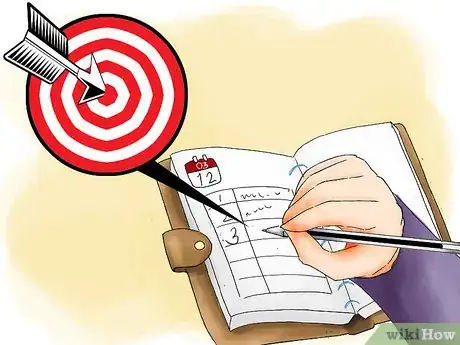


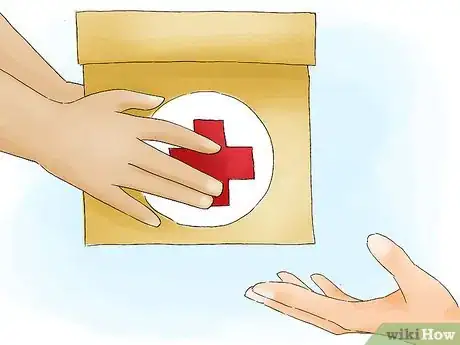









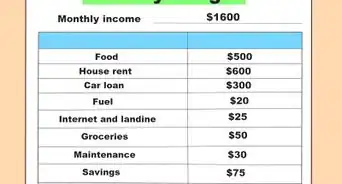
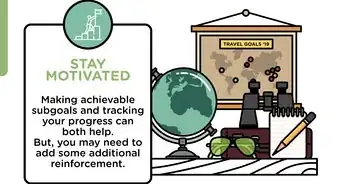




-Step-10-Version-3.webp)
















